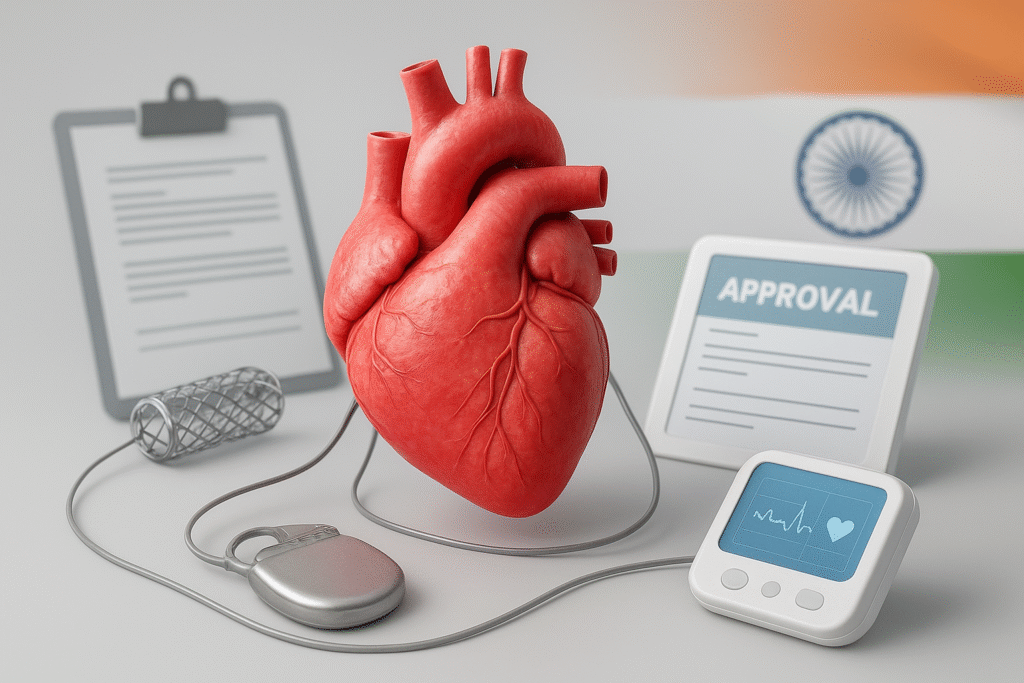India’s Growing Cardiovascular Device Market
The burden of cardiovascular disease in India has been rising steadily, driven by lifestyle changes, an aging population, and increasing awareness of early diagnosis and treatment. This surge has created a strong demand for advanced cardiovascular medical devices—ranging from stents, pacemakers, cardiac monitoring systems, implantable defibrillators, and prosthetic heart valves.
According to recent market analyses, the Indian cardiovascular device segment is among the fastest-growing within the $11 billion medical device market, with double-digit growth expected through 2025. For global and domestic manufacturers, India offers both a rapidly expanding patient base and a supportive but evolving regulatory framework.
To enter this market successfully, understanding the Central Drugs Standard Control Organization (CDSCO) requirements is critical—particularly for devices that are considered non-predicate.
What is a Non-Predicate Cardiovascular Device?
In India, a predicate device is one that already has an approved equivalent on the CDSCO database with the same intended use, material, and design. A non-predicate device, by contrast, is a novel product that does not have a legally marketed equivalent in India.
For cardiovascular manufacturers, this pathway is especially relevant for innovative devices such as:
- New generations of drug-eluting stents
- Next-generation pacemakers and cardiac rhythm management systems
- Transcatheter heart valves with unique designs or materials
- Wearable cardiac monitors with AI-based algorithms
Since these products are considered higher-risk and lack a predicate, CDSCO requires a more rigorous regulatory process before granting approval for import or manufacture.
CDSCO Regulatory Pathway for Non-Predicate Devices
The approval pathway for non-predicate cardiovascular devices is defined under the Medical Devices Rules (MDR), 2017. Manufacturers should be prepared for additional regulatory scrutiny, including clinical investigations.
1. Clinical Investigation Application
- Submit Form MD-22 through the SUGAM portal.
- The application must include a detailed clinical investigation plan, Investigator’s Brochure, and ethics committee approvals.
- If accepted, CDSCO grants permission via Form MD-23.
2. Post-Investigation Marketing Application
- Once clinical data is generated, submit Form MD-26 for permission to import or manufacture the device.
- CDSCO reviews safety, performance, and clinical evidence before issuing Form MD-27.
3. Documentation and Fees
- Applications must comply with the Fourth Schedule of MDR, 2017.
- Relevant government fees are applicable at each stage of the process as per CDSCO regulations.
4. Final Licensing
- After approval, apply for the appropriate license:
- Form MD-15 (import license)
- Form MD-9 or MD-5 (manufacturing license, depending on facility type)
Classification of Cardiovascular Devices in India
Under the MDR, 2017, cardiovascular devices are classified by risk level:
- Class A (Low Risk): Accessories such as non-invasive monitoring electrodes.
- Class B (Low-Moderate Risk): Diagnostic and monitoring devices like external Holter monitors.
- Class C (Moderate-High Risk): Short-term implantable devices such as certain pacemakers.
- Class D (High Risk): Life-sustaining or long-term implantable devices like coronary stents, transcatheter heart valves, and implantable defibrillators.
Understanding classification is crucial, as it dictates whether a device requires only documentation or also clinical evidence under the non-predicate route.
Why This Pathway Matters for Cardiovascular Manufacturers
The non-predicate pathway opens the Indian market to innovative cardiovascular devices that improve patient outcomes but lack domestic regulatory history. However, it also presents challenges:
- Longer timelines due to mandatory clinical investigations.
- Higher investment in trial design, data generation, and compliance.
- Stringent review by CDSCO technical committees.
For manufacturers, this means preparing a robust regulatory strategy early in the development cycle to avoid delays and rejections.
How Titans Medical Consulting Can Support Your Journey
At Titans Medical Consulting, we specialize in guiding cardiovascular device manufacturers through India’s complex regulatory landscape. Our expertise includes:
- Dossier Preparation: Complete documentation aligned with CDSCO’s Fourth Schedule.
- Clinical Investigation Support: Designing study protocols, selecting sites, and coordinating with ethics committees.
- Regulatory Submissions: Handling MD-22, MD-23, MD-26, and MD-27 submissions with precision.
- Market Entry Strategy: Identifying the right classification pathway and mitigating regulatory risks.
With our experience, manufacturers can confidently pursue non-predicate approvals, ensuring faster access to one of the world’s most promising cardiovascular device markets.
Conclusion
India’s cardiovascular device market is growing at an unprecedented pace, offering both opportunity and regulatory complexity. For manufacturers of non-predicate devices, the pathway may appear daunting—but with a clear understanding of CDSCO requirements and the right consulting support, successful entry is well within reach.
By working with Titans Medical Consulting, you ensure not just compliance, but a smooth, efficient, and strategically guided approval process.
Sources & References
- Medical Devices Rules, 2017 – CDSCO
- Medical Device & Diagnostics Division – CDSCO
- SUGAM Portal – CDSCO Online Licensing

